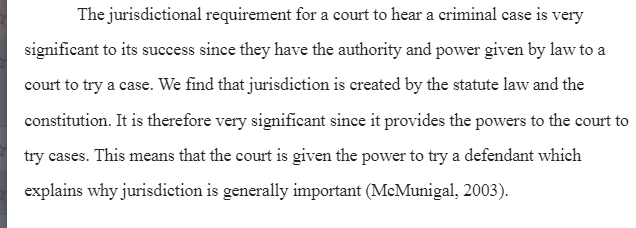Power of Jurisdiction in Criminal Law -A central component to any criminal case is the jurisdictional requirement for a court to hear a criminal case. In your examinations this week, focus on the power of jurisdiction and its significance as part of the criminal justice system. Who creates jurisdiction, and why is it so significant? Similarly, a sound understanding of the legal requirements of a crime is essential for all criminal justice professionals. You must be able to dissect a criminal statute to understand what actions and mindset are required to be proved to gain a conviction. Criminal statutes are precise, and your understanding of the elements of crime must be precise as well.
- Detail the significance of elements of crimes. At a minimum, your response must detail all of the following:
- Define the term elements of a crime in your own words.
- What happens when an element (or elements) of a crime are found to be vague or ambiguous?
- Why must criminal laws be in writing?
Power of Jurisdiction in Criminal Law-Articles
Jeffrey, C. R. (1959). Pioneers in criminology: The historical development of criminology (Links to an external site.)Links to an external site.. Journal of Criminal Law and Criminology, 50(1), 3-19.doi:10.1177/00471178030172005
- Understanding the sources of criminal law are essential to any understanding of current, criminal law issues. Not surprisingly, the issues faced by the criminal justice system today have been issues for centuries. This comprehensive analysis of not just the origins of criminal law, but its effectiveness and its accountability are presented for students.
McMunigal, K. C. (2004). A statutory approach to criminal law (Links to an external site.)Links to an external site.. Retrieved fromhttp://scholarlycommons.law.case.edu/cgi/viewcontent.cgi?article=1539&context=faculty_publications
- Read pages 1286-89, 1290- 91, and 1293-1295
- This article points out the fact that all criminal laws (statutes) must be in writing, and the state must prove each part of the statute (elements of the crime) to gain a conviction Do not get lost in “legal terms” in reading this article. Remember, statute equals criminal law, which creates a crime. All crimes must be clear and provide people with a plain understanding of what is a crime (called notice). If something is not written (created by a legislature), then it is not a crime.
Sterans. A. W. (1936). Evolution of punishment (Links to an external site.)Links to an external site.. Journal of Criminal Law and Criminology, 27(2). doi:10.2307/1135604
- The origins of punishment as a means of deterrence or retribution cannot be traced to one singular event. The notions of punishment, and its level of appropriateness, has changed over the years, but understanding this central, criminal justice concept is essential to any understanding of criminal law and its goals.
Power of Jurisdiction in Criminal Law-Multimedia
Welcome to the LAW. (2010, July 1). 002 History of US law and what is the law? (Links to an external site.)Links to an external site.[Video file]. Retrieved from https://youtu.be/IOa2KI59RYs
- This six-minute video provides a sound synopsis of criminal law and the Constitution’s effect on the criminal justice process.
Accessibility Statement (Links to an external site.)Links to an external site.
Privacy Policy (Links to an external site.)Links to an external site.
Robbins, K. (n.d.). Criminal justice process: Proceedings before trial (Links to an external site.)Links to an external site. [Presentation slides]. Retrieved from https://yanno.wikispaces.com/file/view/StreetLawChapter+13-1.ppt
- This PowerPoint presentation explains the entire process from arrest through pre-trial motions. Jurisdiction for a crime determines whether the police have authority to arrest and where the criminal charges will be adjudicated. This presentation should be used throughout weeks one through four for reference concerning both substantive motions and for the timing of events in criminal procedure.
An Accessibility Statement does not exist.
Privacy Policy (Links to an external site.)Links to an external site.
Supplemental Materials
Wallace, H. (2000). Federal and state jurisdiction (Links to an external site.)Links to an external site.. In A. Seymour, M. Murray, J. Sigmon, M. Hook, C. Edmunds, M. Gaboury, & G. Coleman (Eds.), 2000 national victim assistance academy. Retrieved from https://www.ncjrs.gov/ovc_archives/academy/chap2-1.htm
- Detailed overview of the foundations of jurisdiction and its origins.
An Accessibility Statement does not exist
Answer Preview-Power of Jurisdiction in Criminal Law

